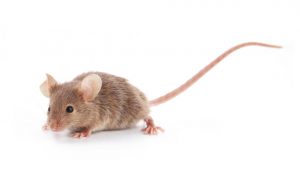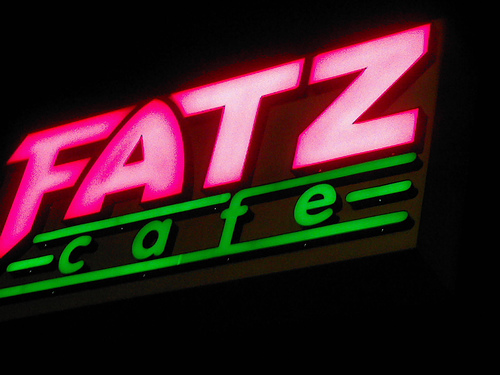 We had our first, monthly, Food Science Café, last night, and while numbers were small, I still believe that, if you build it, they will come.
We had our first, monthly, Food Science Café, last night, and while numbers were small, I still believe that, if you build it, they will come.
As long as it’s useful.
Adrianna Deweese of the Kansas State Collegian wrote that Douglas Powell, scientific director of the International Food Safety Network at K-State, said the purpose of the monthly discussions is to talk about food safety and science in a different setting than a classroom.
Powell showed his meat thermometer to those in attendance, and said it is important to get a digital, instant-read, tip-sensitive meat thermometer, which costs about $12.
.jpg) "Lots of people use it for whole birds or roasts, but I think it’s more important actually for the burgers and the ground beef," Powell said. "Ten years ago I would have never used one, but now I feel naked when I don’t – I feel vulnerable."
"Lots of people use it for whole birds or roasts, but I think it’s more important actually for the burgers and the ground beef," Powell said. "Ten years ago I would have never used one, but now I feel naked when I don’t – I feel vulnerable."
When he is asked at a restaurant how he would like his hamburger cooked, Powell said he responds he would like it "160," meaning he would like it cooked to 160 degrees Fahrenheit.
Food color often is a poor indicator of when it is properly cooked, Powell said. K-State food-safety research has found about 25 percent of tested hamburgers turned brown before they reached a safe temperature of 160 degrees Fahrenheit, he said.
"We’re always just trying to find one way to put information out and take information in," he said. "We’re just always trying to find new ways to get it out there so we have fewer sick people."
The network also has several blogs at www.donteatpoop.k-state.edu and
barfblog.foodsafety.ksu.edu. Powell also wore a T-shirt Monday night that said "ne mangez pas de caca," which is French for "Don’t eat poop."
"It’s had more effect than anything else," Powell said of the message.
Angela Dodd, senior in food science, was quoted as saying Food Science Café discussions are
"a great way for students to become aware of what’s going on in the media about food safety. Food pertains to everybody, and it’s a part of everybody’s life."
I didn’t really like the long table set-up. Next month, we’re probably going to do it in the on-campus bowling alley. Only place to get a beer at K-State.
 “The business can only be reopened if the entrepreneur has thoroughly cleaned everything up and has taken measures to prevent vermin”, the NVWA said. All food supplies currently in the store must also be discarded. The situation in the cafe was unsafe and a public health hazard, an NVWA spokesperson said to the broadcaster.
“The business can only be reopened if the entrepreneur has thoroughly cleaned everything up and has taken measures to prevent vermin”, the NVWA said. All food supplies currently in the store must also be discarded. The situation in the cafe was unsafe and a public health hazard, an NVWA spokesperson said to the broadcaster.

 animals.
animals. Breaches of food safety offences included failing to control flies and keep work surfaces clean.
Breaches of food safety offences included failing to control flies and keep work surfaces clean.
 Food safety culture is a set of values wherein food safety risks are openly identified, discussed, and addressed. What this means is that anyone who works there — from manager to dishwasher — knows that paper towels can reduce risks so they refill the dispenser. Food safety is supported from the organization but it’s the front-line folks who hold the health of patrons in their hands. An organization like Aramark needs to be building the food safety culture capacity behind the scenes, not just touting how clean everything looks now.
Food safety culture is a set of values wherein food safety risks are openly identified, discussed, and addressed. What this means is that anyone who works there — from manager to dishwasher — knows that paper towels can reduce risks so they refill the dispenser. Food safety is supported from the organization but it’s the front-line folks who hold the health of patrons in their hands. An organization like Aramark needs to be building the food safety culture capacity behind the scenes, not just touting how clean everything looks now. Like the barf poetry crowd.
Like the barf poetry crowd. Director of Training Sara Anderson said,
Director of Training Sara Anderson said,  We had our first, monthly, Food Science Café, last night, and while numbers were small, I still believe that, if you build it, they will come.
We had our first, monthly, Food Science Café, last night, and while numbers were small, I still believe that, if you build it, they will come..jpg) "Lots of people use it for whole birds or roasts, but I think it’s more important actually for the burgers and the ground beef," Powell said. "Ten years ago I would have never used one, but now I feel naked when I don’t – I feel vulnerable."
"Lots of people use it for whole birds or roasts, but I think it’s more important actually for the burgers and the ground beef," Powell said. "Ten years ago I would have never used one, but now I feel naked when I don’t – I feel vulnerable." President Jon Wefald likes to remind me that Kansas State University will not be getting a hockey arena any time soon. I even gave him one of our collectors T-shirts (left, exactly as shown) and he said, no way.
President Jon Wefald likes to remind me that Kansas State University will not be getting a hockey arena any time soon. I even gave him one of our collectors T-shirts (left, exactly as shown) and he said, no way..jpg)